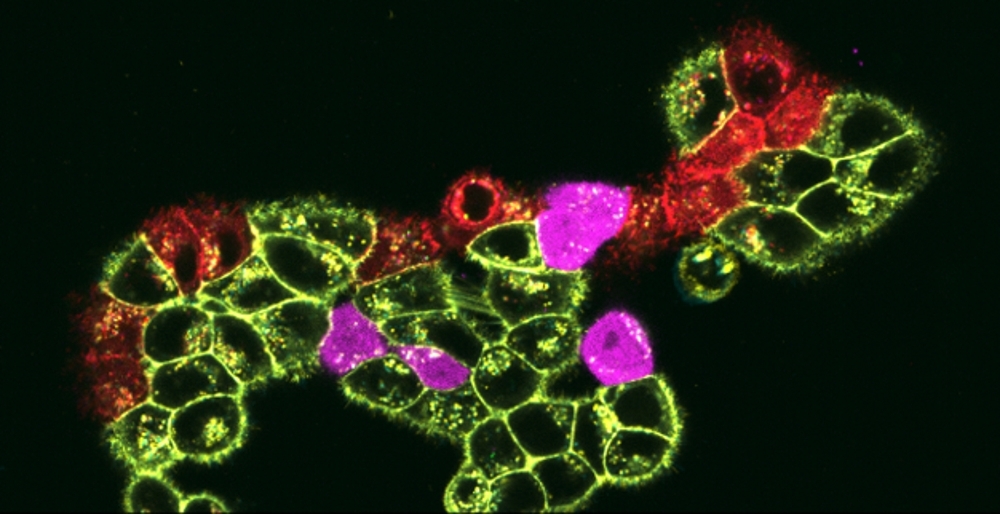Intercellular Communication and Cancer
ABOUT
The iCan research group at the i3S institute is dedicated to uncovering the complex networks of intercellular communication that drive cancer progression, metastasis, and therapeutic resistance. Led by José Carlos Machado, whose career encompasses seminal contributions in cancer genetics, molecular diagnostics, and translational cancer research, the group emphasizes a multidisciplinary and integrative approach. The group maintains a strong translational research focus, with a diverse research program bridging fundamental biology with clinical applications. Students and team leaders within iCan are actively encouraged to pursue innovative ideas, developing novel tools and approaches to address long-standing challenges in the broader fields of intercellular communication and cancer biology.
RESEARCH
iCan's research leverages multiple cancer models, including gastric, pancreatic, leukemia, lymphoma, and lung tumors, to investigate how intercellular signaling influences cancer cell behavior, modulates immune responses, and fosters resistance to therapy. By studying extracellular vesicle signaling, cell-extracellular matrix (ECM) interactions, immune cell modulation, and microenvironmental dynamics, the group aims to identify and validate novel therapeutic targets, advancing cancer treatment and patient outcomes.
Cell-ECM Interactions and Cancer Invasion
Joana Figueiredo’s research investigates the role of E-cadherin mutations in modulating the interplay between cancer cells and the extracellular matrix (ECM). Her team has identified Integrin β1 as a critical factor in promoting abnormal cell-ECM interactions and driving cancer invasion, particularly in gastric cancer. Figueiredo’s work also highlights the role of ECM components, such as laminin γ2, in supporting cancer cell survival and motility, providing new insights into tumor aggressiveness.
Tumor Immunology and Therapy Resistance
The team led by José Carlos Machado focuses on understanding how cancer cells evade immune surveillance and develop resistance to therapies. His research explores the intricate communication between cancer and immune cells, demonstrating how molecular profiles of cancer cells are manipulated to suppress immune responses. Machado’s team is also uncovering the role of intercellular communication in promoting resistance by transferring resistance traits between cancer cells. These findings challenge traditional models of therapy resistance and point toward new therapeutic targets that disrupt intercellular communication in the tumor microenvironment.
Extracellular Vesicles and Pancreatic Cancer
Sónia Melo's team explores the role of extracellular vesicles (EVs) in pancreatic cancer, particularly how EVs are used by cancer cells to reprogram the tumor microenvironment. Her group focus on identifying the molecular cargo within these vesicles and determine how they influence tumor progression and resistance to therapy. By understanding the mechanisms of EVs-mediated communication, Melo’s team aims to develop novel therapeutic strategies to disrupt these pathways and improve patient outcomes.
Leukemia and Lymphoma Microenvironment
Nuno R. dos Santos' team focuses on the molecular and cellular mechanisms that promote leukemia and lymphoma, particularly the role of the thymic microenvironment in T-cell leukemia. His research delves into how leukemic cells manipulate the microenvironment to support disease progression and evade immune responses. He is also investigating new immunotherapeutic strategies, such as targeting the PSGL-1 checkpoint to enhance immune activity against lymphoma.
Together, these diverse yet complementary research areas within iCan illustrate a comprehensive commitment to addressing fundamental questions and clinical challenges in cancer research through innovative, interdisciplinary collaboration.

Team
Selected Publications
Simultaneous detection of lung fusions using a multiplex RT-PCR next generation sequencing-based approach: A multi-institutional research study. BMC Cancer18(1):, 2018. [Journal: Article] [CI: 28] [IF: 2,9]
DOI: 10.1186/s12885-018-4736-4 SCOPUS: 85051742631
Fernandes M.G.O., Jacob M., Martins N., Moura C.S., Guimarães S., Reis J.P., Justino A., Pina M.J., Cirnes L., Sousa C., Pinto J., Marques J.A., Machado J.C., Hespanhol V., Costa J.L.
Targeted gene next-generation sequencing panel in patients with advanced lung adenocarcinoma: Paving the way for clinical implementation. Cancers11(9):, 2019. [Journal: Article] [CI: 26] [IF: 6,1]
DOI: 10.3390/cancers11091229 SCOPUS: 85071868403
Adem B., Vieira P.F., Melo S.A.
Decoding the Biology of Exosomes in Metastasis. Trends in Cancer6(1):20-30, 2020. [Journal: Review] [CI: 51] [IF: 14,2]
DOI: 10.1016/j.trecan.2019.11.007 SCOPUS: 85076252541
Marques J.F., Junqueira-Neto S., Pinheiro J., Machado J.C., Costa J.L.
Induction of apoptosis increases sensitivity to detect cancer mutations in plasma. European Journal of Cancer127:130-138, 2020. [Journal: Article] [CI: 16] [IF: 9,2]
DOI: 10.1016/j.ejca.2019.12.023 SCOPUS: 85078673234
Freitas J.A., Gullo I., Garcia D., Miranda S., Spaans L., Pinho L., Reis J., Sousa F., Baptista M., Resende C., Leitão D., Durães C., Costa J.L., Carneiro F., Machado J.C.
The adaptive immune landscape of the colorectal adenoma–carcinoma sequence. International Journal of Molecular Sciences22(18):, 2021. [Journal: Article] [CI: 7] [IF: 6,2]
DOI: 10.3390/ijms22189791 SCOPUS: 85114644531
Ruivo C.F., Bastos N., Adem B., Batista I., Duraes C., Melo C.A., Castaldo S.A., Campos-Labori F., Moutinho-Ribeir P., Morão B., Costa-Pint A., Silva S., Osorio H., Ciordia S., Costa J.L., Goodrich D., Cavadas B., Pereira L., Kouzarides T., MacEdo G., Maio R., Carneiro F., Cravo M., Kalluri R., MacHado J.C., Melo S.A.
Extracellular Vesicles from Pancreatic Cancer Stem Cells Lead an Intratumor Communication Network (EVNet) to fuel tumour progression. Gut71(10):2043-2068, 2022. [Journal: Article] [CI: 78] [IF: 24,5]
DOI: 10.1136/gutjnl-2021-324994 SCOPUS: 85130807227
Bastos N., Castaldo S.A., Adem B., Machado J.C., Melo C.A., Melo S.A.
SMC3 epigenetic silencing regulates Rab27a expression and drives pancreatic cancer progression. Journal of Translational Medicine21(1):, 2023. [Journal: Article] [CI: 3] [IF: 7,4 (*)]
DOI: 10.1186/s12967-023-04448-1 SCOPUS: 85168891055
Adem B., Bastos N., Ruivo C.F., Sousa-Alves S., Dias C., Vieira P.F., Batista I.A., Cavadas B., Saur D., Machado J.C., Cai D., Melo S.A.
Exosomes define a local and systemic communication network in healthy pancreas and pancreatic ductal adenocarcinoma. Nature Communications15(1):, 2024. [Journal: Article] [CI: 22] [IF: 14.7 (*)]
DOI: 10.1038/s41467-024-45753-7 SCOPUS: 85185621701
Pereira J., Melo S., Ferreira R.M., Carneiro P., Yang V., Maia A.F., Carvalho J., Figueiredo C., Machado J.C., Morais-de-Sá E., Seruca R., Figueiredo J.
E-cadherin variants associated with oral facial clefts trigger aberrant cell motility in a REG1A-dependent manner. Cell communication and signaling : CCS22(1):, 2024. [Journal: Article] [CI: 2] [IF: 8.2 (*)]
DOI: 10.1186/s12964-024-01532-x SCOPUS: 85186257378
Pereira J.L., Arede L., Ferreira F., Matos A., Pereira D., Santos R.F., Carmo A.M., Oliveira M.J., Machado J.C., Duarte D., dos Santos N.R.
Antibody blockade of the PSGL-1 immune checkpoint enhances T-cell responses to B-cell lymphoma. Leukemia39(1):178-188, 2025. [Journal: Article] [CI: 1] [IF: 13.4 (*)]
DOI: 10.1038/s41375-024-02446-w SCOPUS: 85207331538


